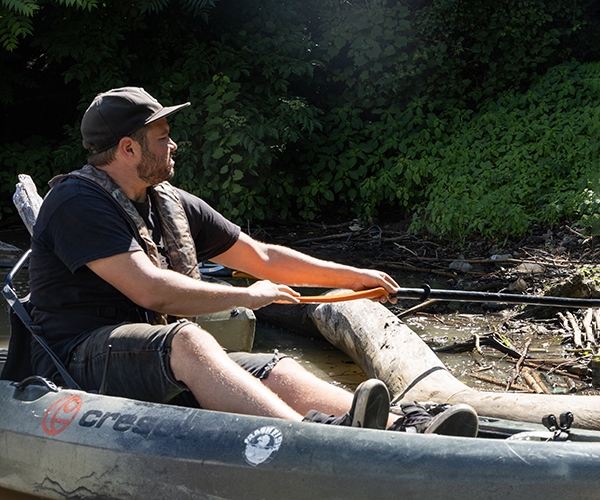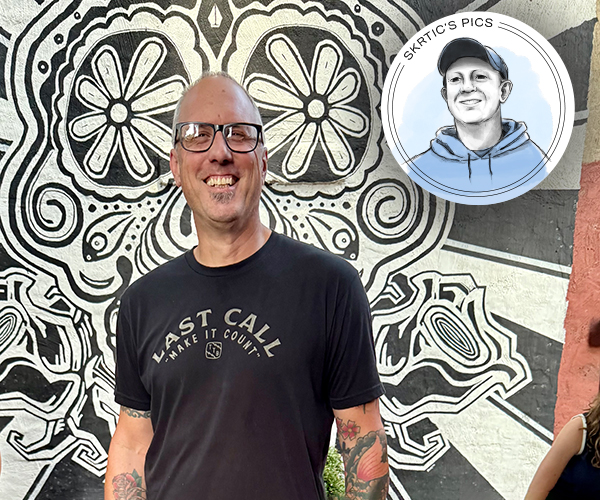In the Sagamore Hills Medical Center emergency department, four cardiac patients wait, one with a blood-pressure cuff tightening around his arm. When Dr. Eric Roter enters the room, he doesn't introduce himself, doesn't address the what's-going-on-Doc?-please-tell-me-it-won't-hurt look. He simply passes out four sets of headphones and removes a long musical instrument from a zippered case. It resembles a pogo stick with strings.
"I'm going to turn this on," Roter says. "Let me know if you feel any pain."
The patients smile.
Dr. Roter's "Prescriptunes"For low energy:"Try the Mendelssohn 'Octet,' with Jascha Heifetz [RCA No. 61766]. Heifetz was one of the greatest instrumentalists ever. He had no peers and his playing had an icy heat that was present in every note he played." For depression:"If you are grieving or searching for The Creator, try Beethoven's last string quartet, Op. 135, performed by the Budapest Quartet [Bridge No. 9072]. To experience the transition from human to heaven, nothing comes closer. Beethoven is my favorite composer and the Budapest Quartet was one of the greatest quartets ever. I had the fortune to work with Alexander Schneider, one of the violinists. We performed in Carnegie Hall. He was in his 80s and had more energy than most people in their 20s. "If you are just feeling blue and really want to shed some tears, listen to Chopin's 'Nocturnes' performed by Artur Rubinstein [RCA No. 63049]. Once you are feeling better, supplement your more positive mood with Mozart's 'The Magic Flute.' I grew up listening to a recording with the great tenor Fischer-Dieskau [Deutsche Grammophon No. 449 749]." For children:"My children always want to hear 'Daddy's CD' ['Pediatric Rounds'] and many parents have told me that their kids are comforted when they listen to these selections. I would also recommend Mozart's 'Clarinet Concerto.' My son Ben listens to it every night and it helps him fall asleep. My favorite recording is with Charles Neidich and the Orpheus Chamber Orchestra [Deutsche Grammophon No. 423 377]." For brain clarity:"Try listening to Bach's 'Well-Tempered Clavier' performed by Glen Gould [Sony No. 52600]. His performances of Bach are unrivaled." For impotence:"Hmm. I can't tell you that because it might hurt Pfizer and Lilly." For overactive libidos:"Go to the classical CD bin at your local supermarket. No prescription needed." |
There will be no tests, no needles, no bad news for them today. The strange-looking instrument is an electric cello made by Yamaha and powered by two double-A batteries. Roter adjusts the reverb so that, to anyone wearing headphones, the Bach he's about to play will sound as if it's being performed in Severance Hall instead of the "pelvic room" in the stand-alone ER. This is where babies are born when their mothers can't make it to the hospital. There's an incubator in the corner, bins of plastic tubing on the shelves, several wheeled IV stands by the bed and a container where used needles are discarded on the wall. But if the patients close their eyes when Roter begins to play, perhaps they can imagine sitting in front of a massive stage instead, the anticipation of live performance tickling their spines.
Roter places a weathered bow — one he's had since high school — on the shiny black instrument and draws it across the strings. To his naked ears, the music sounds quiet, tinny, as bodiless as the cello itself.
"I can feel the sound," he explains. "I can hear it inside without hearing it."
His regular cello would disturb other patients and staff, but this one produces a sound so soft that Roter can perform these free musical interventions, as he calls them, when things are slow in the ER.
This isn't "music therapy," Roter says. He just wants to enhance his patients' experience in the ER by focusing their attention on something beautiful, even if it's just for a few minutes. He sees patients when they're upset, in pain and braced for the worst experience possible. When they hear him play, they get a reprieve. They don't know he's a master cellist who attended the Juilliard School and studied with some of the best musicians in the world. They just know he's brought them something special in a time of need.
The cardiac patients put their headphones on. As Roter plays the first notes of Bach, they close their eyes, relax their shoulders and submit.
The ER is a musician's nightmare: terrible acoustics, constant interruptions and a preoccupied audience. But Roter, whose all-absorbing brown eyes can go from impatient to empathetic in a heartbeat, courts challenges in life, work and art. Slight, reddish-haired and scalpel-sharp even on two hours' sleep, he makes you want to move faster, talk faster, think faster. Forty-one years old and the father of three children under 7, Roter not only finds time to make music in this stressful workplace, but to make fresh bread for his co-workers on weekends, too.
When there are no patients, he practices the cello in a room where the other doctors nap. It doesn't take long to lose his technique. A day, maybe two. He started playing the cello in the third grade because it was the largest string instrument, and wind instruments weren't offered until the next year. Roter knows how he wants to sound. He's spent three decades making his sound.
"I wish more people could understand what I do," he says. "Most people don't have the ear to understand my style. It's like with actors. In 'A Streetcar Named Desire,' you couldn't have just any actor. You needed Marlon Brando."
You might even say Roter's cello playing is Brando-esque: unconventional, focused, infused with the depth of his own experience and psychology. He doesn't worry about the extraneous, doesn't sway back and forth with his body or wear the pain of Mozart on his face. Every movement, every breath is orchestrated for the benefit of the sound, where all his emotion pools.
Roter's desire to reach people pushed him to choose medicine over music as a career. A child of musical parents and grandparents, he compares his maternal grandfather, a public school music teacher, to the inspirational lead character in "Mr. Holland's Opus." Roter started attending classes at Juilliard while in high school in New York City. Although he had talent, "I don't think I was a child prodigy," he says. His first year of college, he was so frustrated by his playing that he almost quit.
Instead, the next summer, he practiced at least six hours a day, sometimes for as long as 10 hours straight, without breaks for food.
He caught up to the prodigies that next year, even surpassed many of them.
"He is a beautiful cellist whose playing is of a near-extinct kind," says world-renowned cellist Nathaniel Rosen, his former teacher. "The kind that melts the music into your psyche."
As good as he was then, Roter wondered if he could do something else with his talents that would reach beyond classical music's small audience. Could he be very good at something besides playing the cello while maintaining his mastery of the instrument?
After attending both Juilliard and the Manhattan School of Music, he went to Case Western Reserve School of Medicine to find out.
Case has a reputation for taking "bent arrows," a term coined by Dr. Daniel L. Horrigan, former associate dean for admissions and student affairs, that describes someone who took another path before deciding to be a doctor.
Roter lugged his large cello (there was no electric one back then) to class and gave recitals in the lecture halls. But once he became a resident, he hardly had time to practice at all. After residency, he worked for a year in a Level 1 trauma center in Rochester, N.Y., then moved back to Northeast Ohio. He worked at Euclid Hospital, then Huron Hospital, before settling in at Sagamore Hills.
When Roter first picked up the cello again, he drowned out his sound with the television volume. Eventually, he could bear to listen to himself and started playing for people again. One night, he invited a colleague, Dr. Phillip DeMio, to his home, where he played some children's music for DeMio's then 3-year-old son, Daniel, who is autistic. DeMio recalls how the tension disappeared from Daniel's face, how he began to perk up and move closer to Roter as he played.
"It was like he was being called from a natural thing that was outside of him," DeMio says. Convinced that music helps Daniel, DeMio, an autism and developmental disorders specialist, has worked it into his son's daily routine. And he would like to bring some of his patients to Roter.
Roter says he would love that. The CD he released in November, "Pediatric Rounds," was inspired by the songs that used to comfort him as a child, and he hopes his renditions do the same for sick children now. Merging his twin passions — music and medicine — is "the most satisfying thing for me."
After his brief ER concert ends, the cardiac patients thank Roter, though one says she would have liked to hear some "oldies" instead. ("Those are pretty old," he replies.)
Roter has a nurse take their blood pressures again. Three of the four experienced a drop; only one had his blood pressure rise slightly, from 155/72 to 157/78. Roter reads the findings aloud, explaining that he can't say for sure that the music is responsible. There are so many variables. It could be they were finally sitting down after doing cardiac-therapy workouts, the lighting, anything.
Although hard evidence that music improves health is hard to find, music therapy is a well-recognized field. Music can soothe people who are in distress, help Alzheimer's patients connect and even be used as anesthesia, says Dr. Richard Lederman, neurologist and director of The Cleveland Clinic's Medi- cal Center for Performing Artists. Along with working his music into his medical practice, Roter is trying to expand awareness of the link between music and medicine on www.ermusic.org, a Web site he started with his wife, Elisabeth, a rheumatologist at University Hospitals. They summarize the research objectively, hoping to engage the ailing as well as the musically curious.
Have arthritis? The Roters point out that music has helped decrease pain levels in sufferers of osteoarthritis and rheumatoid arthritis. Preparing for childbirth? While the effect of music on laboring mothers isn't well researched, the Roters say all the subjects in one study found that listening to music helped them relax while giving birth. Feeling anxious? The Roters will tell you to pick some music that you like and listen to it — most studies reported that their subjects felt less anxious when they did that, although there is conflicting evidence about whether music improves the physiological indicators of stress, such as blood pressure and heart rate. In fact, "there is more convincing medical research on positive physiological effects of moderate alcohol consumption than there is on the effect of music," the Roters write.
The couple also treats their readers to no-nonsense editorial comments (in "E.R.'s bottom line") and personal stories. In addition to summarizing studies on how listening to Mozart affects intelligence, Eric shares his anecdotal experience of playing classical music on the streets of New York City:
"There were certain pieces of music we knew would always draw crowds and keep them enthralled. They were all composed by Mozart, not only his most famous piece, the 'Eine Kleine Nachtmusik,' but any Mozart we played."
A few minutes after the cardiac patients leave, Roter walks to an empty, dimly lit room with two beds. It's less cluttered than the pelvic room, starker.
"Many people have died in this room," Roter announces. He points to a light encased in a small metal dome hanging over one of the beds. "And this is the last thing they saw. It should be a piece of art or something."
Most people like to talk about events. Roter likes to talk about moments.
"I know how important music is because I'm aware of how short life is," he says. "I realize that every minute is a special minute."
Sometimes, special minutes just present themselves. Sometimes, Roter engineers them, as he did one late-February morning when Maureen Lowis, a young mother suffering from terminal brain cancer, came to the ER with a bad cough. While she waited for her chest X-ray to come back, Roter performed "Ave Maria" for her. Her eyes closed as he played, her body relaxed and she smiled. In the year and a half she had spent fighting cancer, she saw many doctors, but none treated her to something like that, says her husband, Terrence.
"It was amazing to be in an emergency room and be settled down by such music," he adds. "She could set herself free at that moment."
In a way, by performing musical interventions, Roter sets himself free as well. He must stay emotionally detached while he's holding the stethoscope or the prescription pad. But when he's done all he can medically, the music fills the awkward emotional space between doctor and patient. He can't stay with his patient all night and hold her hand, but his music can soothe her. He can't tell her she'll be fine, but the music can reassure her. He can't tell her how bad he feels for her, but the music says, "I'm human, too." The experience becomes less of an ordeal for the patient. The music turns it into a succession of moments instead, some of which stand out as special, unforgettable, even divine.



